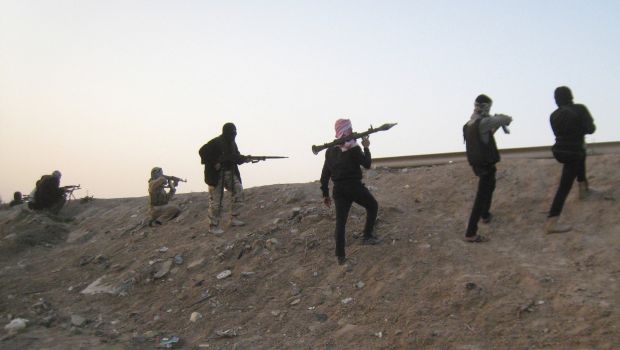
Masked Sunni gunmen take up position with their weapons during clashes with Iraqi security forces outside the city of Fallujah, west of Baghdad, on February 23, 2014. (REUTERS/Stringer)
Baghdad, Asharq Al-Awsat—Violence continued in Iraq’s Anbar province on Thursday after a suicide car bomb targeting an army checkpoint killed four soldiers. The Iraqi army also confirmed the death of 25 alleged terrorists, including one sniper, in the restive western province where the government has been trying to drive out militants affiliated to the Islamic State of Iraq and Syria (ISIS) who forcibly seized territory in the region earlier this year.
Iraq’s Interior Ministry on Thursday announced that it had killed two ISIS leaders in northern Saladin Province, part of escalating security operations against ISIS. Baghdad has sought to mobilize local tribal forces to fight alongside the Iraqi military against the ISIS militants, previously granting “deceived” Sunni tribesman who had joined with the group a deadline to lay down their arms.
In comments to Asharq Al-Awsat earlier this week, Iraqi Foreign Minister Hoshyar Zebari denied that the ongoing security crisis in Anbar was the result of Prime Minister Nuri Al-Maliki’s domestic policies, stressing this was the result of external issues. He said: “The repercussions of the Syrian crisis, especially for Al-Anbar, have been fatal. ISIS’s audacity has reached the point where they took control of the whole governorate, however, with the efforts of the government and security forces—helped by the tribes of Al-Anbar and local leaders and security forces—the city of Ramadi and the western area of Al-Anbar have been taken back.”
“There is still a problem in Fallujah where terrorist groups are hiding, and there is a movement of people away from Al-Anbar. The government has taken a number of decisions, such as keeping Iraqi forces out of the cities to avoid civilian casualties, and averting the possibility of turning the fight against the insurgents into a sectarian conflict,” he added.
However, many Iraqi politicians have accused Maliki of purposefully seeking to incite a sectarian conflict in Iraq, most prominently Sunni leader and parliamentary speaker Osama Al-Nujaifi and prominent Shi’ite leader Moqtada Al-Sadr.
Thousands of pro-Sadrist demonstrators staged demonstrations across central and southern Iraq on Monday. Sadr had previously labeled Maliki a “tyrant” and “dictator” just days after announcing his departure from politics. The Shi’ite leader has called for more anti-government protests to take place next Monday.
Iraqi Foreign Minister Zebari told Asharq Al-Awsat: “The political situation is currently in crisis due to the absence of serious dialogue and the lack of dialogue mechanisms which were previously followed.”
“There were meetings of political leaders under the sponsorship of President Jalal Talabani who gathered all parties around the table. These days, this type of mediator is absent, and no important political meetings between the leaders and the political forces in Iraq have been held to search for a solution or a plan to move forward. We hope that this will happen in the coming period, and we hope Iraqi leaders will rise to the level of responsibility and affirm unity, cooperation and joint solidarity, and form an agenda for the meetings with agreed targets,” he added.
Zebari denied that there was a sectarian conflict in Iraq, emphasizing that this is a conflict against terrorism. “The war is not Shi’ite against Sunni, but a Sunni–Shi’ite–Kurdish war on terrorism. We do not hide the fact that there are problems, which we hope we can overcome and take control of the situation ahead of the elections,” he said.
Sawsan Abu Hussein contributed reporting from Baghdad.
